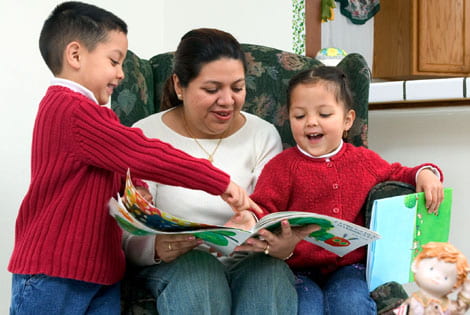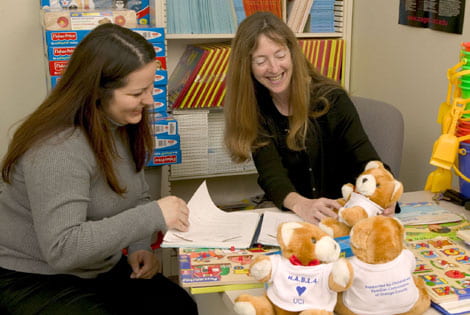Seeds of learning
Innovative outreach program helps Latino families discover language and life skills
Maria Ines Victor saw herself as mother and caretaker, not teacher. She assumed, like her parents before her, that education began when children entered school. That was until a UCI HABLA outreach worker came to her Santa Ana home three years ago to read books and discuss colors and shapes with her 2-year-old son, Israel.
“My mother never read to me,” says Victor, who speaks little English. “The best part of HABLA for me was learning how to communicate with my child at his level. Once I learned this, I could take it from there.”
Victor’s success with Israel, now 5, prepared him to enter kindergarten this fall with strong language skills. Moreover, she believes her HABLA training has placed her 3-year-old daughter, Alejandra, on par with many of the older children in her preschool program.
HABLA, founded in 2001 by Virginia Mann, cognitive sciences professor in the School of Social Sciences, is helping more than 350 Santa Ana families challenged by poverty, low education levels and language barriers. The family-oriented literacy outreach program helps parents learn how to become their children’s first – and most important – teachers. As a result, their 2- to 4-year-old children, primarily Spanish speakers, are now better prepared to succeed in school.
EARLY ACHIEVEMENT
The heart of HABLA is expressed by its name, which means “speak” in Spanish – officially, it is an acronym for Home-based Activities Building Language Acquisition. In home visits by HABLA educators, parents are encouraged to read and play with their children in their native language. For two years, these HABLA outreach workers pay families twice-weekly, half-hour visits, each time bringing along a book, game or toy that is left with the family.
“Sit with the child and mother and say, ‘Oh, look, I brought this book,’” Mann says to her staff of teachers. “Show the child the book, begin a dialogue with the child and let the parent see the child enjoy this interaction. Model, then come back and see if the modeling is being followed. As the child learns to name the colors and objects, and follow the story, you can say to the mother, ‘Look how smart your child is; look how much you are teaching her!’”
And it’s OK to do it in Spanish, Mann says. “The parents need to speak the language they are most comfortable with. This way, they will be able to fulfill their role as their child’s best teacher, instead of leaving the child to watch television. The Spanish they teach their children will be the basis for the English the children will learn in school.”
Mann knew from her research that children learn language actively – by talking with mom and dad – rather than passively, by sitting in front of a television, as many Spanish-speaking parents believe. HABLA outreach worker and UCI senior Yesenia Ortiz, herself a Spanish-speaker until kindergarten, says she could see the same thing in the homes she visited. One child, she says, barely spoke.
“One day, the dad came home for lunch and they just sat in front of the TV,” Ortiz says. “He didn’t say one thing to his son, except for ‘hello,’ and he didn’t say anything to his wife. I realized, this is why the child isn’t speaking.”
At the end of Ortiz’s work with the child, she says, “He was excited. He was speaking. There was a huge difference.”
Observations like this are being confirmed in ongoing research by Mann and her students. After two years of HABLA, they find that children possess Spanish-language skills that are appropriate for their age, where other children in their neighborhoods tend to have skills that are significantly below the norm.
INTERACTIVE LEARNING
HABLA’s effectiveness was affirmed when it became an accredited replication site of the National Parent-Child Home Program (PCHP) – one of five sites in California and among 143 worldwide. “This is a critical time for early childhood programs across the country,” says Sarah Walzer, PCHP executive director. “While extensive research continues to underscore the importance of parent-child verbal interaction and the significance of early childhood language and literacy experiences, funding cuts across the country are limiting families’ access to quality programs – leaving growing numbers of children very far behind when they enter school.”
Most of the funding for the HABLA program – about $1 million so far – has come from Proposition 10 tobacco tax money provided by the Children and Families Commission of Orange County. The staff of outreach workers has grown from 18 in the first year to 30 in the third, and has been a mix of UCI students, AmeriCorps volunteers and community members.
One of HABLA’s newest outreach workers is Maria Ines Victor, whose two children benefited profoundly from the program. She now enthusiastically volunteers her time, telling other parents how valuable the experience has been for her family.
“It was not part of my culture before to sit on the floor to talk and play with my children,” Victor says. “The growth in communication and learning has been muy importante.”

